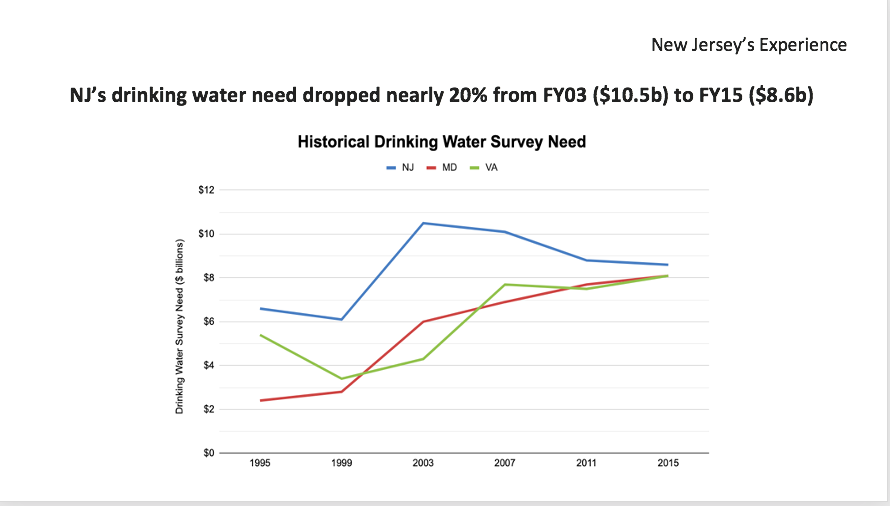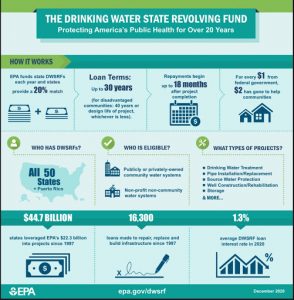How More Accurate Water Utility Reporting Could Increase Federal Funds
The Environmental Protection Agency (EPA) awards federal grants annually to states for drinking water projects based on a needs survey that is conducted every four years. This aid is provided through the Drinking Water State Revolving Fund (DWSRF). In New Jersey, the Department of Environmental Protection (NJDEP) administers the EPA’s Drinking Water Infrastructure Needs Survey and Assessment, which helps quantify the water utilities’ projected 20-year need.
Recent research by Gary Brune, senior policy manager at New Jersey Future and a member of Jersey Water Works’ backbone staff, confirmed that New Jersey’s projected need and its share of federal funds for drinking water projects have steadily declined in recent years. The EPA survey is an opportunity for the state to ensure that utilities have adequate funds for capital improvements, including maximizing New Jersey’s share of new federal aid that may be available in the years ahead.

Specifically, Brune found that New Jersey’s projected drinking water needs dropped nearly 20% from FY 2003 ($10.5 billion) to FY 2015 ($8.6 billion). Are our drinking water needs actually declining? The research shows that’s not the case. Most likely, drinking water needs simply are being underreported. The problem is that some water utilities do not appear to report the full extent of their needs. This may be happening because water utilities are unsure of the survey’s requirements, including the types of documentation required by the EPA.
The survey requires water utilities to report several different categories of need, including water treatment plant upgrades, rehabilitation of water sources, reconstruction of water distribution systems, and creation of new infrastructure. Given the extensive list of reporting categories, the survey may overwhelm or exceed a utility’s capacity, resulting in incomplete reporting.
New Jersey’s share of federal drinking water grants has dropped steadily, from 2.44% in FY 1997 to 1.71% in FY 2019. Left unattended, it will probably continue on this path. If New Jersey still received 2.44% of the national total, it is estimated that it would receive an additional $8 million per year. If chronic underreporting continues, water utilities won’t have the funds needed to ensure a state of good repair and complete essential upgrades. So how can water utilities accurately represent their 20-year drinking water needs in these surveys?

The survey responses are due to NJDEP by July 15, 2021. After reviewing the submissions, NJDEP will coordinate with the water utilities to resolve any issues or concerns expressed by EPA. A national report must be issued by EPA to Congress by February 2022. With Congress set to consider plans to upgrade the nation’s infrastructure, including President Biden’s American Jobs Plan that would provide $111 billion for water-related improvements, this effort to re-establish New Jersey’s rightful share could not be better timed.
A recent public opinion survey released by Jersey Water Works and New Jersey Future as a followup to a survey conducted in 2017 indicated that respondents’ highest environmental concern is drinking water quality. Public support is important for water infrastructure projects—particularly funding for those projects. Respondents also indicated that ensuring that all people have safe drinking water should be a top priority for our governor and Legislature.
For more information, please contact Gary Brune (gbrune@njfuture.org), senior policy manager at New Jersey Future, or Alaina Ungarini (Alaina.Ungarini@dep.nj.gov), Bureau of Water System Engineering, Planning and Program Coordination Section at the New Jersey Department of Environmental Protection.